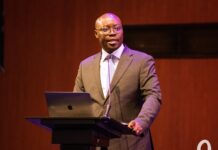A Ghanaian-American fibre optics inventor, Dr. Thomas Mensah, has proposed that development of a Bullet-train system in the country to link northern and southern parts at the back of fibre optic technology will optimise movement of goods and services in the country’s transportation industry.
“We are pushing for the development of Bullet-trains in this country; we are going to do it. If we have a fibre optic line along such high-speed railway lanes, a passenger can sit with a Wi-Fi in the train and have Internet. And when the fibre optic is all the way to Tamale, we can branch off to all the villages and all corners; it means that broadband services can be available there.”
Dr. Mensah made the proposal in Accra at the opening of the maiden Broadband Ghana Forum in Accra. The forum was organised by the Broadband Communications Chamber (BCC) under the auspices of the Ministry of Communications, under the theme ‘Broadband: The Catalyst for Sustainable Socio-economic Development’.
Dr. Mensah explained that Bullet-trains would move fast in transporting people to and from urban areas, which would improve the country’s economy and science and technology sector.
“We can grow the economy by building Bullet-trains in Ghana, which is very important. It means in one and half hours I can leave Accra and be in Tamale,’’ he said.
The Bullet-train is another form of a railway system designed for speeds above 200-300 kilometres per hour (kmph) and is generally called high-speed – sections of these routes may have lower speed limits for safety reasons.
Only 16 nations have high-speed railways – China boasts the world’s longest network with 27,000km of such tracks. Japan, Spain, France and Germany are the others where tracks dedicated for high-speed trains stretch over 1,000 km.
Mrs. Ursula Owusu Ekuful, Minister of Communications, urged telecommunication operators in the country to discuss co-sharing broadband infrastructure to reduce overhead cost and ensure low cost for Internet in the country.
There are a lot of fibre optic cables deployed by some individual broadband companies, telcos and Internet Service Providers (ISPs) on the ground which are not being co-shared. It is therefore important for these players to sit together and discuss how to co-share the infrastructure, Mrs. Ekuful stated.
She said: “We have a lot of metro fibre around the large cities, while major parts of this country are not covered. We can’t continue this way. It is very expensive to lay fibre, so we can sit down in a room to decide that, ‘okay, there is enough fibre here’. We all want to extend our service to another location.
“Let us join our resources instead of everybody laying down fibre to extend services to, say, Nandom. Let’s decide that, ‘okay, company A will do point A to point B. Company B will continue from point B to point C. Or an infrastructure company – set up not to provide the services but to lay down the infrastructure – will lay down the fibre and everybody will lease needed capacity to do their work.”
Mrs. Ekuful further stated: “So, they will reduce their capital expenditure and they won’t need to invest so much in building their own fibre network; they can lease capacity from infrastructure companies to extend their services to the areas they want to extend services to.
“So, we believe that if we work together to develop an infrastructure-sharing code and facilitate that – and make it easier for them to also extend their service – there will be competition alright, but they will be competing on the quality of services they provide; and it gives consumers more choice, too.
“They can decide as to which network to use in their locality. We want to connect the entire country within the next two to three years. It is possible if we work with the network operators, broadband wireless operators and Internet service providers to see how best we can do this by sharing the cost of laying down the necessary infrastructure and pooling our resources together – because at the end of the day if it works and every part of this country is connected, all of them can expand their services to all parts of the country instead of the small geographical locations they are limited to now,” she stated.
Elorm Gustav Tamakloe, Chief Executive Officer of the Broadband Communications Chamber (BCC), an advocacy and lobbying group for development and expansion of the broadband industry, and organisers of the forum admitted that “In todays’ world, broadband is a critical part of any national economic and social development agenda”.
This, he noted, is because it drives economic growth, productivity and job-creation.
“It is absolutely essential for Ghana’s economic future, long-term productivity growth and global economic competitiveness. With broadband infrastructure, delivery of voice, video and data at ultra-high-speed yields numerous benefits – including connectivity improvement, better health and education services, and efficient government services,” Mr. Tamakloe remarked.










